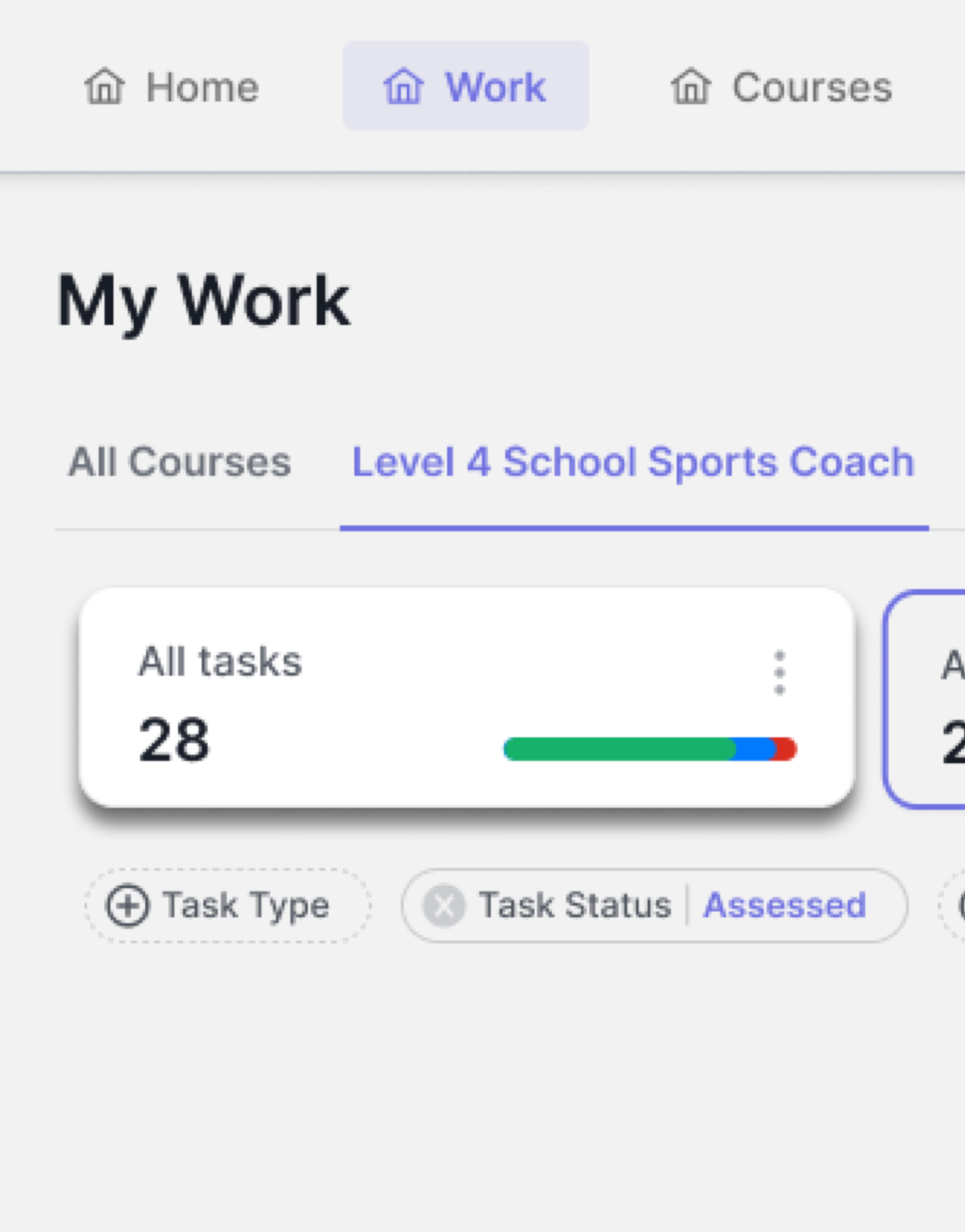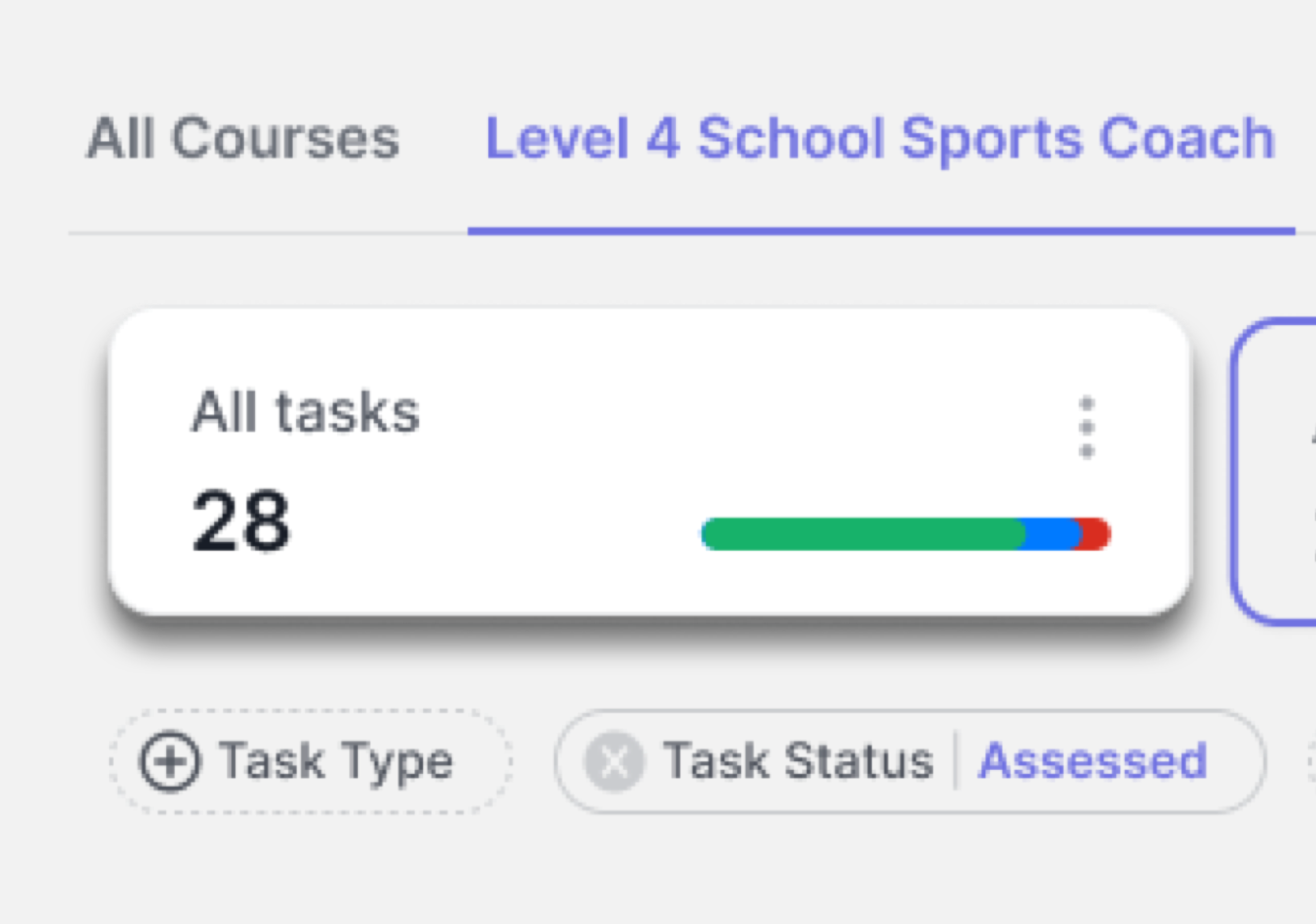Share course materials, handbooks, templates, and other resources directly within the platform. This makes it easier to distribute relevant documents to specific groups, modules, or collaborative projects without resorting to external tools.
Enable multiple users to contribute to the same document or project in real time. Ideal for group assignments, course content creation, or departmental strategy documents, this feature encourages teamwork and real-world problem-solving skills.
Send automated updates, reminders, or announcements via email and SMS. This ensures important messages reach learners promptly, especially those who prefer mobile alerts or have limited access to the platform during work placements.
Integrate schedules for upcoming classes, exams, or workshops into a unified calendar view. Tutors and learners can sync these events with personal calendars, reducing conflicts and keeping everyone on track with key milestones.
Support self-improvement and collaborative learning by allowing learners to comment on or assess each other�s work. Structured peer review processes can enhance critical thinking, encourage quality improvement, and build a supportive learning community.
Allow tutors and administrators to post important updates or institution-wide bulletins. By centralising key information, learners remain informed about deadlines, policy changes, or upcoming events, ensuring a streamlined communication process.
Host synchronous online sessions that replicate the traditional classroom, complete with presentations, breakout rooms, and interactive tools. This feature promotes active participation and gives learners the chance to engage with experts or guest speakers in real time.
Provide dedicated online workspaces where learners can work together on shared projects, assignments, or study groups. This fosters teamwork skills, which are highly valued in both apprenticeship programmes and workplace training settings.
Enable structured conversations around course topics, industry updates, or research findings. Forums encourage peer-to-peer support and collaborative problem-solving, enriching the overall learning experience across BTECs, Apprenticeships, or professional development programmes.
Facilitate instant communication between learners, tutors, and assessors. This allows for quick clarifications, immediate feedback, and dynamic group discussions, promoting timely support for both classroom-based and work-based learning scenarios.
Adhere to GDPR and other data protection regulations by defining how long specific records remain on the system. Built-in tools enable secure data archiving or deletion after a set period, minimising privacy risks and supporting regulatory compliance.
Send automated notifications about approaching certificate expiry dates, policy review deadlines, or upcoming mandatory training sessions. By proactively communicating key milestones, this feature helps maintain ongoing compliance.
Distribute and track mandatory policy reviews or acceptance of updated regulations. Learners and staff electronically confirm their understanding of compliance documents, providing an auditable record of policy dissemination.
Upload, organise, and manage compliance-related documents�such as Right-to-Work checks or ID verification�within the LMS. Centralising these records ensures they are easily accessible for audits and inspections, while maintaining data integrity.
Identify skill deficiencies or areas for development by mapping learner performance to specific competency standards. This ensures targeted learning interventions, improves workforce readiness, and enables clear action plans for learner progression.
Set automated reminders and processes for certificates that require periodic renewal. This feature ensures learners and organisations remain compliant by prompting users to re-take or update qualifications before they expire.
Maintain detailed logs of learner interactions, content updates, and administrative actions for proof of compliance. These audit trails help meet internal governance policies and external inspection requirements, such as those set by Ofsted or awarding bodies.
Facilitate the secure exchange of learner data with awarding bodies and regulators to streamline certification and reporting. This saves administrative time and reduces manual errors, ensuring alignment with UK vocational qualification frameworks.
Automatically award certificates, badges, or digital credentials upon completion of programmes, modules, or assessments. This streamlined process records learner achievements, supports motivational frameworks, and ensures the authentication of acquired skills.
Monitor whether learners have completed mandatory training, achieved required qualifications, or met specific regulatory standards. Real-time dashboards highlight non-compliant users, enabling swift intervention and maximising learner safety, funding compliance, and reputational assurance.
Fine-tune every visual aspect of the platform by editing CSS or advanced styling options. Ideal for organisations with strict brand guidelines or unique design requirements, this level of control guarantees a polished, professional finish.
Leverage a drag-and-drop editor to rearrange or add widgets that best meet your organisation�s needs�such as announcements, calendar events, or performance metrics. This flexibility empowers administrators to create dashboards suited to various roles, from tutors to senior management.
Deliver content in multiple languages and adapt cultural settings such as date formats or currency symbols. This ensures learners in different regions or from diverse backgrounds have an engaging, user-friendly experience.
Edit default system messages to include your tone of voice, branding, or additional information. By tailoring communication templates, you maintain consistency across every interaction, from enrolment confirmations to assignment reminders.
Issue certificates and digital badges that mirror your organisation�s branding. This helps celebrate learner achievements in a visually consistent way, supporting ongoing motivation, recognition, and portfolio-building.
Upload your organisation�s fonts and logos to ensure consistency with existing marketing materials. Having a unified visual style across your website, printed materials, and LMS can reinforce brand recognition and credibility.
Allow administrators or individual users to customise dashboard layouts by choosing relevant widgets, modules, or quick links. Personalisation fosters ownership of the learning space, helping to emphasise the specific data and tools users need most.
Design a welcome page that highlights your logo, colour scheme, and messaging. Custom login screens offer an immediate sense of professionalism and cohesion for learners and staff as they access the platform.
Set your brand�s colour palette and apply it throughout the platform�s user interface. Aligning the LMS appearance with your organisation�s established look and feel creates a familiar environment that resonates with learners, staff, and external stakeholders.
Present a seamless brand experience by hosting the LMS under your own domain name and removing or replacing default platform labels. This approach supports a consistent corporate or institutional identity, whether you�re a college, private training provider, or employer delivering in-house courses.
Streamline fee collection and financial administration by integrating with payment gateways and finance applications. This feature is particularly beneficial for commercial course offerings, ensuring seamless invoicing and real-time revenue tracking.
Incorporate external assessment platforms or e-portfolio solutions for easy submission, evaluation, and evidence tracking. This simplifies processes for apprenticeships, vocational qualifications, or professional bodies that require detailed workplace-based evidence collection.
Use CSV, XML, or other data formats to import new learner records, course information, or assessment results. You can also export data sets for in-depth analysis or compliance checks, ensuring flexibility to meet the unique requirements of your organisation.
Include Microsoft Teams, Zoom, or other virtual meeting solutions within your LMS to deliver live training sessions or webinars. Learners can join interactive lessons directly from the platform, and session data�like attendance or recordings�can be captured for reporting and quality assurance.
Connect to external content hubs and resource libraries, allowing you to embed or curate materials from a broad range of sources. This feature expands your repository of digital resources, enhancing curriculum breadth and learner engagement.
Enable smooth data sharing with employer-facing portals or workplace tools, particularly vital for Apprenticeship programmes and work-based learning. This ensures off-the-job training records, attendance, and progress updates are synchronised to give employers real-time visibility of their staff�s development.
Link CRM platforms to help track and manage prospective learners, apprentices, or clients. Bringing sales and marketing data into your LMS supports targeted engagement, streamlines recruitment processes, and aligns business growth with learner management.
Support widely used SSO providers, including Microsoft 365 and Google, to streamline authentication and reduce password fatigue. This ensures users can access the platform with their existing credentials, enhancing both security and convenience.
Ensure that the platform�s interface adapts smoothly to various screen sizes and resolutions. This feature helps keep navigation intuitive and user-friendly, regardless of whether the learner is using a smartphone, tablet, or laptop.
Offer robust integration points for seamless data exchange with external platforms. Real-time webhooks and REST-based APIs enable training providers, colleges, and employers to automate workflows, maintain accurate learner records, and synchronise information across multiple systems.
Connect directly with HR or Student Information Systems to keep user data up to date and automatically manage enrolments. This integration reduces manual data entry while maintaining accurate records for compliance and reporting requirements in Further Education and Apprenticeship settings.
Track mobile-specific metrics like engagement rates, session durations, and completion times. These insights help your organisation optimise learning strategies, identify potential issues, and maintain high-quality delivery across multiple device types.
Give users control over settings such as notification preferences, display modes, and accessibility options. Personalising the mobile experience fosters greater autonomy and motivation, ultimately supporting learner satisfaction and retention.
Adhere to recognised standards, such as WCAG, ensuring the mobile interface accommodates diverse abilities. Features like text resizing, voice-over support, and adaptive navigation help create an inclusive learning environment.
Allow learners to capture and upload evidence, images, or videos straight from their mobile devices. This feature is invaluable for apprenticeships and practical courses where on-site tasks and assessments require immediate proof of competence.
Facilitate group discussions, private messaging, and feedback channels directly within the native app. This real-time collaboration enhances connectedness and peer support, vital for learners in blended or apprenticeship-based programmes.
Send timely prompts about assignment deadlines, new forum posts, or important announcements directly to users� mobile devices. These alerts help learners and tutors stay informed and engaged, encouraging continuous progress and prompt action where needed.
Design quizzes, surveys, and practical assignments that are simple to complete on a mobile device. Integrated functionality accommodates on-the-go engagement, making it easier for learners to meet assessment deadlines and improve performance.
Provide learners with a dedicated mobile experience on both Android and iOS devices. Access courses, assignments, and progress tracking in a streamlined interface built specifically for smartphone and tablet use, ensuring continuity whether users are on campus, at work, or on the move.
Enable learners to download modules, resources, and assessments for offline study. Once an internet connection is re-established, progress updates and completed tasks automatically sync with the system, offering flexibility and reducing barriers to learning in remote or workplace environments.
Connect with third-party systems�like Management Information Systems (MIS), HR platforms, or employer databases�to enrich your analytics. Unified data sets provide a comprehensive overview of learner performance, compliance status, and overall organisational effectiveness.
Set and monitor Key Performance Indicators (KPIs) relevant to your organisation�s strategic goals. Whether you�re targeting improved pass rates or increased apprenticeship completion, progress toward KPIs can be tracked over time to drive continuous improvement.
Automate the creation and distribution of standard reports, such as weekly progress updates or monthly funding overviews. This feature saves time and ensures consistent reporting cycles, keeping staff and stakeholders well-informed without manual intervention.
Extract data sets in multiple formats for further analysis or sharing with external stakeholders. Advanced visualisation options help you present key insights clearly, supporting effective collaboration within your organisation.
Generate compliance-focused reports that satisfy UK regulatory and funding body requirements (for example, apprenticeship funding claims). Built-in templates streamline data collection, ensuring you can effortlessly meet evidence submission deadlines for audits or inspections.
Track qualification attainment, exam results, and apprenticeship completions across various cohorts or subject areas. By aggregating data on learner outcomes, you can pinpoint performance patterns and refine your teaching methods or programme design.
Compare performance data between different groups, departments, or cohorts, enabling a clear understanding of which strategies are most effective. This side-by-side analysis helps shape institutional policies and demonstrate impact to stakeholders.
Monitor learner attendance in face-to-face and online sessions, alongside their overall progress throughout the course. This feature highlights potential issues early, making it easier for tutors and assessors to intervene and keep learners on track to achieve.
Identify at-risk learners swiftly using predictive analytics and configurable triggers�such as low engagement, missed assignments, or overdue tasks. Real-time notifications prompt staff to provide timely support, helping reduce drop-out rates and improve achievement outcomes.
Generate tailored reports to meet the unique needs of your institution or training organisation. Define key metrics, filters, and visual formats to produce meaningful summaries�whether you�re focusing on funding compliance, learner progress, or specific awarding body requirements.
Gain immediate insight into learner engagement, attendance, and performance through live data visualisations. Ideal for tracking progress across BTECs, Apprenticeships, and other qualifications, these dashboards enable evidence-based decision-making and targeted support.
Allow users to determine how and when they receive notifications about course updates, deadlines, or forum discussions. This flexibility respects personal preferences while ensuring key communications are never missed.
Safeguard sensitive information by capturing user consent and enforcing GDPR-compliant handling of personal data. Administrators can configure data retention rules, anonymisation processes, and audit trails to meet legal obligations.
Keep track of active, inactive, or archived users in one central dashboard. This feature supports re-engagement strategies, retrieval of historical records for compliance checks, and efficient handling of learner departures or course completions.
Enable prospective learners or new staff to register directly through the platform. Tailor data capture forms to collect necessary information for compliance, funding, or institution-specific requirements, automating much of the enrolment process.
Provide tutors and assessors with dedicated profiles detailing their expertise, assigned courses, availability, and performance data. This supports effective resource allocation, communication, and performance monitoring across multiple cohorts or programmes.
Upload or synchronise multiple users from external systems (for example, MIS or HR software) in a single action. Regular synchronisation ensures user data remains up to date, removing the need for manual intervention and reducing errors.
Simplify logins by integrating with existing identity providers such as Microsoft 365, Google Workspace, or corporate directories. SSO minimises administrative overhead while improving user experience by letting learners and staff access the platform with their existing credentials.
Mirror your institution�s organisational layout by creating departmental or cohort-based structures. Group learners and staff by role, subject area, or apprenticeship standard to streamline course assignments, messaging, and reporting.
Consolidate all learner performance data into one central gradebook, providing real-time updates on progress and outcomes. Analytics dashboards deliver insights into pass rates, trends, and areas needing intervention. This integrated approach supports evidence-based decisions for curriculum improvements and learner support.
Allow administrators to define and customise user roles (for example, learners, tutors, assessors, or compliance officers), ensuring each stakeholder has exactly the access they need. This approach minimises security risks, enforces data protection, and streamlines workflows by granting appropriate permissions to specific areas of the system.
Centralise key learner data such as personal details, enrolment status, progress history, and qualification aims. Tutors and assessors can easily track and update learner profiles to enhance personalisation and ensure accurate record-keeping.
Generate certificates and manage official results upon successful completion of assessments or programmes. Automated processes reduce manual data handling, ensuring accurate documentation for regulatory bodies, employers, and learners alike. Custom certificate templates also allow for consistent branding across all qualifications and courses.
Facilitate final evaluations for Apprenticeships with structured EPA workflows. This feature helps coordinate schedules, tasks, and evidence submission, ensuring clarity and readiness for each apprentice. Tools for feedback and result tracking enable timely intervention and reflect real-world competence.
Simplify the verification process required by many awarding bodies, such as for BTECs and Apprenticeships. Tutors, assessors, and external verifiers can easily track, review, and approve work within the same platform. Clear audit trails and version history support quality assurance and regulatory compliance.
Encourage collaborative learning and reflection by enabling learners to evaluate each other�s work or assess their own progress. This feature fosters critical thinking, boosts engagement, and helps individuals take greater responsibility for their development. Tutors can moderate feedback to maintain quality and accuracy.
Provide timely, constructive feedback throughout the learning journey and at key milestones. Tutors can highlight strengths, pinpoint areas for improvement, and direct learners to targeted support. Consistent formative feedback enhances learner confidence and readiness, while summative assessments confirm final achievement levels.
Safeguard academic integrity by automatically screening assignments and submissions for potential plagiarism. Alerts and reports help tutors quickly identify unoriginal work and guide learners in ethical research practices. This feature is especially valuable for large cohorts, ensuring fairness and quality.
Capture performance evidence during practical tasks or workplace activities. Assessors can record observations in real time, upload photos or videos, and link each piece of evidence to specific standards or criteria. This approach offers a flexible pathway for learners in hands-on disciplines, making assessment more authentic and relevant.
Set clear standards for each task by mapping learning outcomes to specific marking criteria. Rubrics help tutors provide structured feedback and ensure consistency across multiple cohorts or courses. This approach simplifies internal verification and aligns with quality assurance requirements for vocational and academic programmes alike.
Enable learners to build digital portfolios that showcase their competence and achievements over time. Ideal for Apprenticeships and vocational qualifications, this feature supports the ongoing collection of work-based evidence, projects, and reflective logs. Tutors and assessors can review submissions remotely, streamlining the feedback and validation process.
Create engaging quizzes and tests with multiple question types suitable for diverse courses and learning levels. Whether it�s a quick knowledge check or a final exam, flexible settings let you control timing, question banks, and retake options. Results feed directly into analytics for data-driven decisions and tailored intervention.
Allow tutors and assessors to set custom assignments aligned with awarding body criteria or specific workplace objectives. Learners can conveniently submit work through the LMS, ensuring a transparent record of progress for BTECs, Apprenticeships, and other programmes. Automated notifications keep everyone on track, making deadlines clear and reducing administrative workload.
Plan and control when materials become available to learners, making it easier to align with term dates, apprenticeship milestones, or specific qualification timelines. Automated release ensures learners receive the right content at the right stage.
Extend your resource pool by integrating external platforms, such as e-book libraries or sector-specific resource hubs. This broadens the variety of learning materials and ensures you stay current with industry developments and best practice.
Design learning content that is inclusive and adheres to recognised accessibility guidelines. By catering to different abilities and assistive technologies, you support equality of opportunity in Further Education and Apprenticeship settings.
Introduce a structured review and approval process for your materials, helping maintain consistent quality. This feature ensures that only vetted, up-to-date content is published, supporting awarding body guidelines and institutional standards.
Incorporate videos, podcasts, simulations, and other immersive media to enrich the learning experience. Interactive content encourages higher engagement levels, supporting diverse learning styles and making lessons more impactful.
Ensure compatibility with widely recognised e-learning standards, facilitating seamless content sharing and tracking. By adhering to SCORM and xAPI, you can easily integrate materials across multiple platforms and gain deeper insights into learner progress.
Store and organise all your learning materials, references, and digital assets in one easily searchable repository. Ideal for Further Education and Apprenticeships, this feature ensures consistent resource access across multiple courses and standards.
Quickly assign learners to multiple modules or entire apprenticeship standards in one go. Group management functionality simplifies coordination, making it easier to oversee class-based cohorts, workplace groups, or team-based learning activities.
Enable efficient content discovery by tagging materials with relevant keywords and metadata. This streamlines searching and categorisation�vital for large-scale apprenticeship or qualification programmes where quick access is crucial.
Create and refine engaging learning materials with user-friendly content development tools. Tutors and training providers can seamlessly produce text, visuals, and interactive elements tailored to UK awarding body requirements.
Maintain a clear audit trail of content revisions, essential for quality assurance and compliance checks. Effortlessly roll back to previous versions when needed, ensuring transparency and consistency across your learning resources.
Seamlessly incorporate external websites, eBooks, and multimedia into your courses. By embedding rich content, you create engaging learner experiences while supporting the development of independent study skills crucial to Further Education and Apprenticeships.
Provide a blended learning experience by integrating face-to-face teaching with digital course delivery. Tools for tutor feedback, attendance recording, and resource distribution help streamline in-person sessions within your LMS.
Monitor learner participation in classroom sessions and online modules. Real-time tracking helps tutors and training providers spot potential issues early, ensuring learners stay on target for successful completion of their qualifications.
Tailor learning routes to specific roles, competencies, or apprenticeship frameworks. This personalisation ensures each learner receives the right content at the right time, boosting engagement and achievement rates.
Keep learners and tutors informed of upcoming deadlines, assignment releases, or workshop schedules. Automated reminders encourage prompt engagement and help meet compliance milestones across Further Education and Apprenticeship programmes.
Efficiently plan and organise face-to-face sessions, workshops, and online modules. A centralised timetable helps you avoid clashes, optimise staff availability, and keep learners on track for their qualification timelines.





